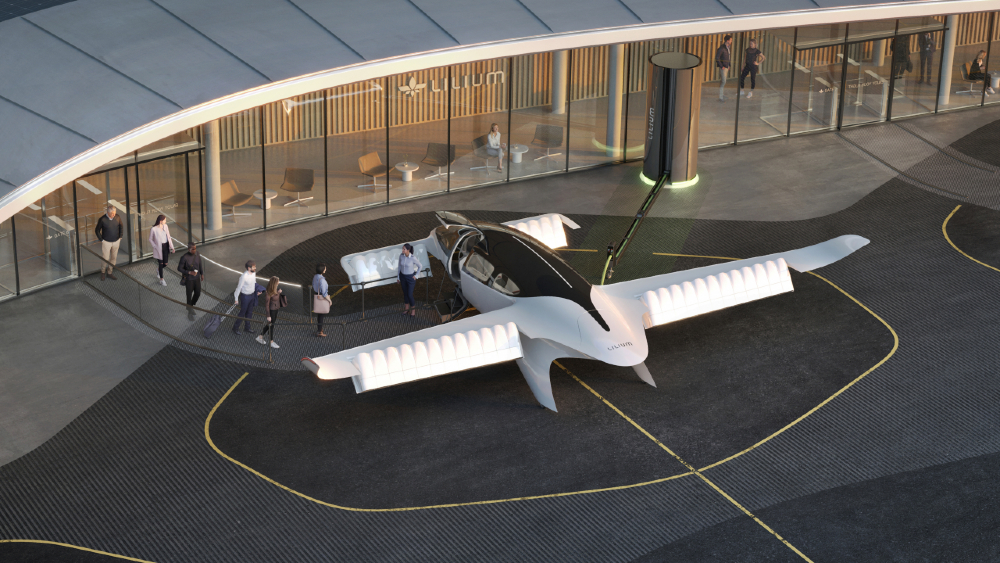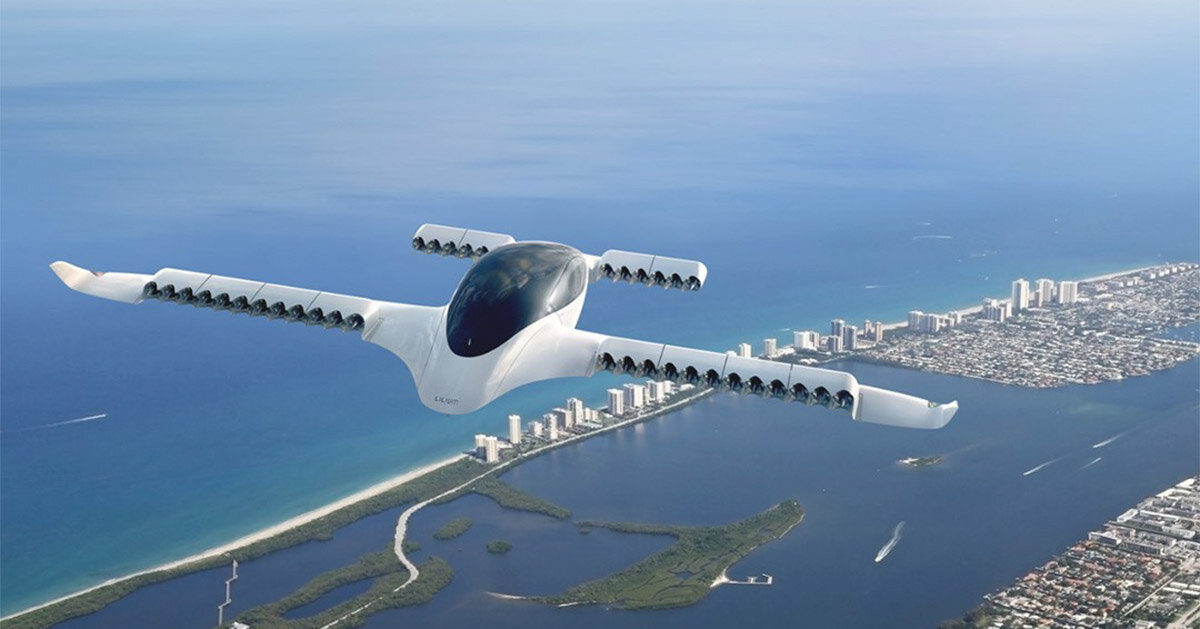German aerospace company Lilium is becoming a major player in the advanced air mobility (AAM) industry. The company is developing the Lilium Jet, an electric vertical take-off and landing (eVTOL) aircraft that can accommodate six passengers and one pilot. Lilium is focused on regional air mobility: transporting passengers across regions using electric aviation. For example, a passenger can fly from New York to Philadelphia on the Lilium Jet, unlike other eVTOL manufacturers whose products can only be used within urban areas.

Lilium's Growing Presence in Florida
On February 8, Lilium announced the expansion of its existing operations in Florida. The state has a strong potential to develop advanced air mobility due to its large aerospace and aviation industries. Florida has over 640 companies specializing in the sector, including aircraft manufacturing, flight training, and space exploration. Furthermore, Florida had three of the U.S.' twenty busiest airports by passenger traffic in 2022: Orlando (MCO), Miami (MIA), and Fort Lauderdale (FLL).
Lilium has designated Orlando International Airport (MCO) as a hub for its operations in central Florida alongside another vertiport in Lake Nona. The company also supported Florida House Bill 981 (HB 981), a state bill that would designate the Greater Orlando Aviation Authority as Florida's AAM test site. This designation will expand on Lilium's partnership with the City of Orlando and Lake Nona. In 2020, the company announced the development of its first U.S. vertiport, a 56,000-square-foot (5,203 square meter) facility in central Florida.

Lilium views central Florida as a strategic hub for the state's AAM operations since the region attracts nearly 80 million annual visitors. Over 24 million people passed through the region's primary airport in 2022, making it the U.S.' eighth busiest airport by passenger traffic. The area is known worldwide for attractions such as Walt Disney World and Universal Studios Florida. Central Florida is also a major business travel destination since it hosts many conventions and trade shows, with the Orange County Convention Center being the country's second-largest convention facility.
Sebastien Borel, Lilium's Chief Commercial Officer, said about its growing Florida operations:
"We are thrilled about the proposed advanced aviation center at Orlando International Airport and commend Orlando for its dedication and vision to advancing AAM. Building a vertiport at the major-hub airport will ultimately enhance regional mobility by increasing passenger access and connectivity while allowing multiple operators to use the facility and share in the cost."

Lilium worked directly with multiple state politicians to establish Florida as an AAM hub. HB 981, which is in the Infrastructure Strategies Committee as of February 10, will allow for the construction of additional vertiports. Multiple local stakeholders will be involved if HB 981 passes since vertiport approvals require input from the community.
Borel said about HB 981:
"We appreciate the work of Chair [of Florida House Transportation & Modals Subcommittee] Fiona McFarland and State Representative Doug Bankson's efforts in this bill to ensure Florida remains a leader in AAM. These strides reinforce our decision to announce central Florida as a key launch region for the Lilium Jet and align with our longstanding commitment to accessible, sustainable transportation. Solidifying the Greater Orlando region as a test bed for AAM demonstrates the state's commitment to progressing regional air mobility and advancing aviation technology."

Lilium's Future Plans
Lilium aims to receive certification from the European Union Aviation Safety (EASA) by 2025 and approval by the U.S. Federal Aviation Administration (FAA) afterwards. A bilateral aviation safety agreement between the FAA and EASA allows the two agencies to collaborate on civil aviation safety regulations. Lilium is the first eVTOL company to receive certification bases from both U.S. and European aviation authorities.
Although Lilium's U.S. operations are mostly in Florida, the company plans to expand into other U.S. markets in the future. In October, Houston-based private aviation firm EMC Jet purchased five Lilium Jets for $10 million each. EMC Jets plans to use the eVTOLs in major Texas cities, including Austin, Dallas, Houston, and San Antonio. Columbus-based private jet charter company NetJets also purchased 150 Lilium Jets in 2022. NetJets will use the eVTOLs for operations, including flights to various locations in Florida.

Lilium is also collaborating with commercial airlines. In December, the company announced a strategic partnership with Lufthansa to develop Europe's eVTOL industry further. The partnership includes developing enough infrastructure to accommodate a projected demand for 9,200 eVTOLs in the European market through 2035. Lufthansa has pledged to cut its carbon emissions in half by 2030 and eliminate them entirely by 2050. The company plans to meet these targets by acquiring more fuel-efficient aircraft and incorporating electric aviation into its operations.
Finally, Lilium has received orders from multiple entities outside the U.S. and Europe. The company has signed agreements with Azul Linhas Aéreas, Heli-Eastern, and Saudia. These deals will help Lilium establish its footprint in Brazil, China, and Saudi Arabia, respectively. Azul will receive 220 Lilium Jets, while Heli-Eastern and Saudia will each acquire 100 eVTOLs.
U.S. Government Admits Liability in Fatal Mid-Air Collision » Air Canada Rouge to Launch Boeing 737 MAX 8 Operations » Alaska Airlines Defends Home Turf with 7 Strategic New Routes for 2026 »
Comments (0)
Add Your Comment
SHARE
TAGS
NEWS Advanced Air Mobility eVTOL Electric Aviation Sustainable Aviation Future Technology Regional Air Mobility Lilium Florida Orlando Startup InnovationRECENTLY PUBLISHED
 Memphis at Midnight: Inside FedEx's Global Superhub
When considering major hub airports in the United States, few might think of Memphis International Airport (MEM). This facility, which is only the second busiest in Tennessee based on passenger volumes, might not boast an impressive flight schedule from passenger airlines. However, across the airfield from Memphis' passenger terminal, FedEx has turned the airport into a critical cargo superhub. In fact, between the hours of 10:00 PM and 5:00 AM, Memphis becomes the busiest airport in the world.
INFORMATIONAL
READ MORE »
Memphis at Midnight: Inside FedEx's Global Superhub
When considering major hub airports in the United States, few might think of Memphis International Airport (MEM). This facility, which is only the second busiest in Tennessee based on passenger volumes, might not boast an impressive flight schedule from passenger airlines. However, across the airfield from Memphis' passenger terminal, FedEx has turned the airport into a critical cargo superhub. In fact, between the hours of 10:00 PM and 5:00 AM, Memphis becomes the busiest airport in the world.
INFORMATIONAL
READ MORE »
 Should Students Have Homework? Better After-School Balance
Is homework bad for students? Explore learning benefits, stress, sleep, and smarter workload limits, so after-school time stays balanced.
STORIES
READ MORE »
Should Students Have Homework? Better After-School Balance
Is homework bad for students? Explore learning benefits, stress, sleep, and smarter workload limits, so after-school time stays balanced.
STORIES
READ MORE »
 Air Canada Rouge to Launch Boeing 737 MAX 8 Operations
Air Canada has officially confirmed a strategic shift for its leisure subsidiary, Air Canada Rouge, announcing that Boeing 737-8 (MAX 8) operations are slated to begin in late Q1 2026. The move marks the beginning of an ambitious year-long transition that will see Rouge evolve into an all-Boeing 737 operator.
ROUTES
READ MORE »
Air Canada Rouge to Launch Boeing 737 MAX 8 Operations
Air Canada has officially confirmed a strategic shift for its leisure subsidiary, Air Canada Rouge, announcing that Boeing 737-8 (MAX 8) operations are slated to begin in late Q1 2026. The move marks the beginning of an ambitious year-long transition that will see Rouge evolve into an all-Boeing 737 operator.
ROUTES
READ MORE »



